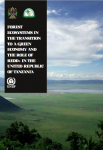A report undertaken by the Tanzania Forest Services, in collaboration with the UN Environment Programme (UNEP) under the UN-REDD Programme, provides an economic rationale for Tanzania to invest in more sustainable use and conservation of its forest assets.
Tanzania is the also focus of a publication by the Center for International Forestry Research (CIFOR), which outlines the rules and choices to be addressed by participatory countries in REDD+ activities and shows potential technical problems and related options.
 July 2015: A report undertaken by the Tanzania Forest Services, in collaboration with the UN Environment Programme (UNEP) under the UN-REDD Programme, provides an economic rationale for Tanzania to invest in more sustainable use and conservation of its forest assets. Tanzania is the also focus of a publication by the Center for International Forestry Research (CIFOR), which outlines the rules and choices to be addressed by participatory countries in REDD+ activities and shows potential technical problems and related options.
July 2015: A report undertaken by the Tanzania Forest Services, in collaboration with the UN Environment Programme (UNEP) under the UN-REDD Programme, provides an economic rationale for Tanzania to invest in more sustainable use and conservation of its forest assets. Tanzania is the also focus of a publication by the Center for International Forestry Research (CIFOR), which outlines the rules and choices to be addressed by participatory countries in REDD+ activities and shows potential technical problems and related options.
Titled ‘Forest Ecosystems in the Transition to a Green Economy and the Role of REDD+ in the United Republic of Tanzania,’ the UNEP report aims to assess whether there is an economic rationale for the reduction of deforestation in Tanzania, by calculating the economic costs and benefits based on current levels of deforestation. A cost-benefit analysis reveals that the present value of net economic losses from deforestation to the Tanzanian economic over the next 20 years amounts to US$171 million. This analysis only includes those provisioning forest ecosystem services that are captured by the system of national accounts, and which can therefore be reflected in the gross domestic product (GDP). This means that, based on available data, it makes economic sense to reduce deforestation and implement policies and measures that tackle the direct and underlying drivers of deforestation. A second scenario analysis using data from Catchment Forest Reserves takes into account the economic effect of deforestation not only on timber resources, but also on other provisioning services, including non-timber forest products, regulating services such as water provisioning and supporting services such as biodiversity. According to this scenario, the value of net losses from deforestation to the Tanzanian economy in the period 2013–2033 amounts to US$3.5 billion, showing that the present value of net losses are an order of magnitude higher when taking into account the effect of deforestation on the full range of forest ecosystem services.
Additional analysis also highlights that investments in the forestry sector lead to comparatively higher incomes for rural populations than the same investments in the sectors of agriculture and wood, paper and printing, and hence could also be beneficial from the perspective of poverty alleviation. These findings highlight the economic case for Tanzania to invest in conserving its forests by tackling the direct and underlying drivers of deforestation and transition, moving towards an economic model that stimulates sustainable use and conservation of forest ecosystems by implementing REDD+.
The CIFOR infobrief is titled ‘Monitoring Deforestation and Forest Degradation in the Context of REDD+: Lessons from Tanzania.’ It concludes that the Tanzania case study indicates that international best practices and improved support to national parties are needed to ensure that consistent, repeatable and transparent methods are used in mapping forest areas and monitoring deforestation at national and regional levels. It is in the interests of each country to assess the different options that exist under REDD+ definitions and the implementation of a measurement, reporting and verification system. Different options and action plans may have major financial implications, determine the work involved and ultimately have consequences on forest preservation. Inconsistencies in forest area and deforestation estimates can undermine confidence in national emissions reference levels and even lead to countries adopting the product that simply gives them the best financial rewards under a REDD+ funding system. In the context of REDD+, scientists and funding agencies need to insist on setting standards for data sets on forest cover and forest cover change. Such products need to be carefully assessed for accuracy before exploitation for national statistics or baseline forest change scenarios.
CIFOR is part of the CGIAR Consortium. [Publication: Forest Ecosystems in the Transition to a Green Economy and the Role of REDD+ in the United Republic of Tanzania] [CIFOR Infobrief] [UNEP Press Release]